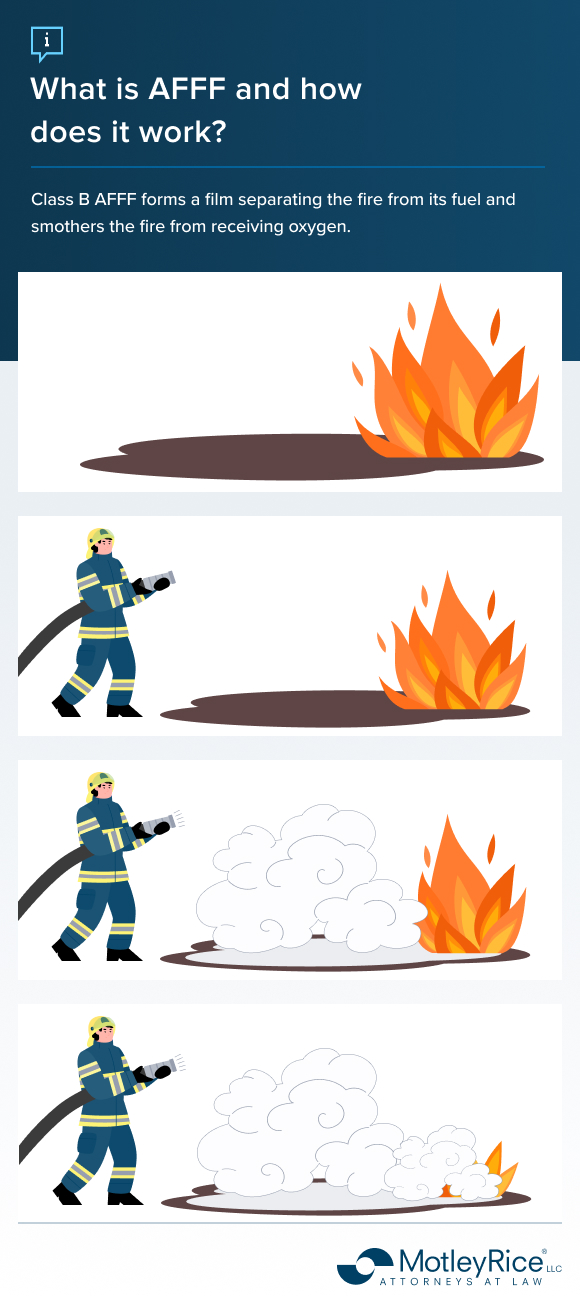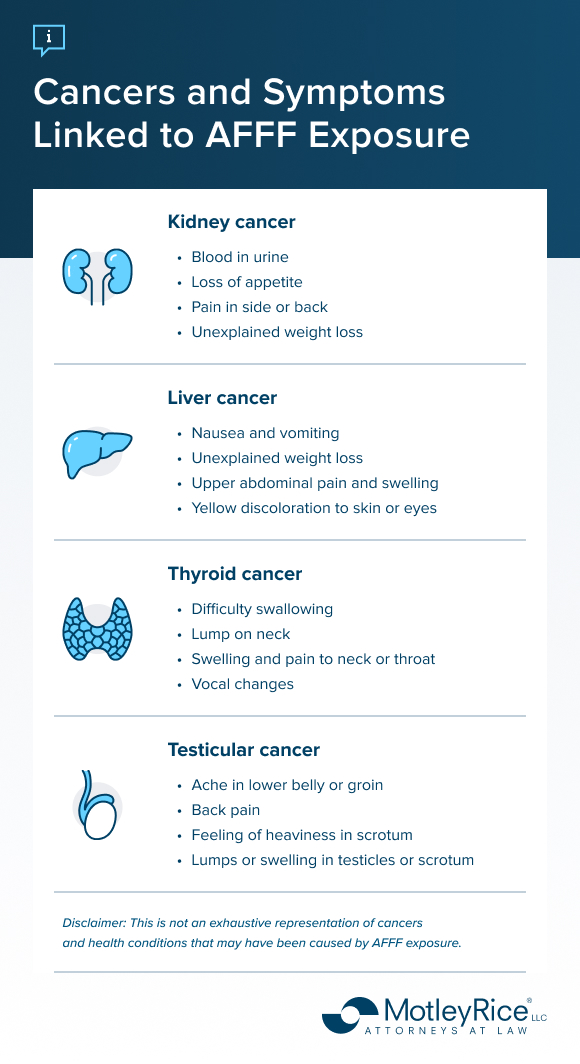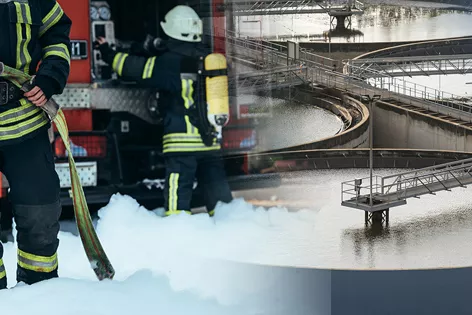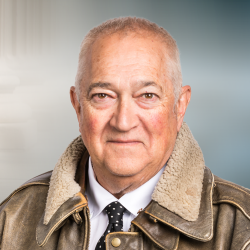
Case Overview
Aqueous film-forming foam (AFFF) has been linked to cancer, thyroid disease, and other negative health problems. Individuals, especially fire fighters, may be exposed directly through contact or by contamination of their water supply. Water providers and property owners who have PFAS contamination due to AFFF have also brought lawsuits against AFFF manufacturers for damages.
What is AFFF?
A firefighting suppressant, AFFF works by coating fuel sources with a thick layer of foam. This blocks the oxygen supply so that firefighters can better extinguish fires.
AFFFs contain polyfluoroalkyl compounds (PFAS), or perfluorinated chemicals, which are toxic. For many decades, AFFF was manufactured with perfluorooctanesulfonic acid (PFOS), a type of PFAS linked to testicular cancer.
PFAS exposure from AFFF may harm anyone exposed as well as damage the environment where it is discharged and the water treatment systems it is processed through.

AFFF exposure background
The Department of Defense began using AFFF in the 1970s to extinguish petroleum-based fires. The firefighting foam was also used extensively in firefighting training on military bases.
The equipment required to use AFFF requires repeated training. Repeated use increases the chances of environmental contamination. Much of the PFAS contamination in communities near airports, air stations and firefighting practice facilities may be from AFFF.
Places that may have been impacted by AFFF
The following locations have been identified as sources of PFAS contamination:
- Military bases
- Manufacturing facilities
- Wastewater treatment plants
- Fuel-spill sites
- Large and small airports
- Bodies of water near the above
Communities near these locations may have suffered damages to property, natural resources, and health. They are entitled to pursue financial compensation and accountability. AFFF attorneys are available to help people in these communities explore their legal options.
What companies may be involved in a firefighting foam lawsuit?
Several companies manufacture AFFF and sell it to the U.S. military. The companies that manufacture AFFF products used in the United States include:
- 3M
- Angus Fire
- The Ansul Co.
- The Buckeye Fire Protection Co.
- Chemguard
- Chemours
- National Foam
- Tyco Fire Products
- United Technologies Corp.
These AFFF manufacturers may be liable for the health problems and environmental damage caused by firefighting foam.
AFFF health hazards
PFAS chemicals can move through soil, contaminate groundwater, and spread through the air. This allows the chemicals to travel long distances from the original source, according to the Centers for Disease Control and Prevention (CDC). The chemicals are water soluble and do not break down.
They are also bio-accumulative, meaning they build up over time in humans and animals and contaminate their blood. Exposure to PFAS chemicals may increase a person’s risk of cancer and other health problems.
According to the CDC, studies show that people exposed to PFAS have a greater risk for developing a number of severe health problems, including:
- Certain types of cancer
- Reduced chances of pregnancy
- Growth, behavioral effects in infants and older children
- Resistance to childhood vaccines
- Increased cholesterol levels
Perfluorooctanoic acid (PFOA), a byproduct of AFFF manufacturing, is also linked to gastrointestinal conditions such as ulcerative colitis.
Types of cancers that may be linked to the use of AFFF
A number of studies have found links between the use of AFFF and certain types of cancers. These types of cancer include:
- Bladder cancer
- Brain cancer
- Breast cancer
- Kidney cancer
- Lung cancer
- Lymphoma
- Prostate cancer
- Testicular cancer
PFAS exposure has also been linked to pancreatic, liver, and thyroid tumors in laboratory animals.
Individuals, especially fire fighters, who experience health complications related to firefighting foam exposure may be eligible to seek compensation through an AFFF cancer lawsuit.

What are AFFF lawsuits?
Given the harm that may be caused by exposure to AFFF, many people including fire fighters, water service providers, governmental entities and public and private property/ landowners have filed suit for medical expenses, costs to treat contaminated water and other damages. These firefighting foam lawsuits are aimed at helping entities and people who have suffered losses as a result of their exposure.
Motley Rice attorneys are involved in the ongoing AFFF MDL. Joe Rice serves as co- lead counsel in In re Aqueous Film-Forming Foams Products Liability Litigation, MDL No. 2873 in U.S. District Court for the District of South Carolina, and Fred Thompson is Liaison Counsel and a member of the Plaintiffs Steering Committee. Anne McGinness Kearse serves as co-chair of the MDL Science Committee and David Hoyle leads the 3M Discovery Team for the PEC in the litigation. The multidistrict litigation complaints allege groundwater contamination near sites where AFFF was used.
The AFFF lawsuits allege toxic chemicals from AFFF use harmed communities near these sites. Because of the exposure, people in these communities may have:
- A heightened need for medical monitoring
- Personal injuries
- Property damage
- Other economic losses
The MDL court is presiding over lawsuits filed by:
- People who live near sites where AFFFs were used
- Governmental entities, including municipalities and local water authorities
- Privately owned water service providers
- Owners of property harmed by exposure to PFAS from fire fighting foam
- Active and retired fire fighters
- People with personal injuries
- Estates for personal injuries suffered by deceased individuals
An AFFF attorney may be able to answer your questions about joining a firefighting foam lawsuit.
Who may qualify for an AFFF foam lawsuit?
Many people who qualify for a firefighting foam lawsuit are people who were exposed at work (occupational exposure). This could include:
- Retired and active fire fighters
- Military personnel
- The estates of those above who are deceased
The PFAS in AFFF can stay in groundwater for long periods of time and can pollute public drinking water supplies.
Our law firm’s experience helping with public health crises
In addition to litigating firefighting foam lawsuits, Motley Rice attorneys have worked for decades to protect victims of large-scale toxic exposures and public health crises.
Our other public health crisis litigation experience includes:
- Representing thousands of workers exposed to asbestos on the job
- Litigating against Big Tobacco for multiple State Attorneys General, resulting in the largest civil settlement in U.S. history
- Representing people in a class action lawsuit against Wolverine Worldwide over PFAS contamination in drinking water
- Co-leading negotiations with BP in the Deepwater Horizon oil spill litigation that resulted in both the Medical Benefits Settlement and the Economic and Property Damages Settlement
- Achieving a settlement with lead pigment companies to fund the removal of toxic lead paint from plaintiffs’ homes
- Serving as MDL co-lead representing thousands of communities in the national opioid litigation.
- Serving as a consultant to the Flemish Region of Belgium against 3M in related PFAS matters.
Explore more of how we have helped litigate toxic exposure claims.
AFFF lawsuit news
AP (Sept. 14, 2023): Firefighters fear the toxic chemicals in their gear could be contributing to cancer cases
PBS (Aug. 13, 2023): Study links ‘forever chemicals’ exposure to testicular cancer among military personnel
Military Times (Nov. 20, 2019): The list of military sites with suspected ‘forever chemicals’ contamination has grown
NPR (Feb. 14, 2019): EPA Says It Plans To Limit Toxic PFAS Chemicals, But Not Soon Enough For Critics
CNN (Feb. 14, 2019): What are PFAS chemicals, and what are they doing to our health?
The Intercept (Feb. 10, 2018): The U.S. military is spending millions to replace toxic firefighting foam with toxic firefighting foam
Prior results do not guarantee a similar outcome.
Motley Rice LLC, a South Carolina Limited Liability Company, is engaged in the New Jersey practice of law through Motley Rice New Jersey LLC. Esther Berezofsky attorney responsible for New Jersey practice.

